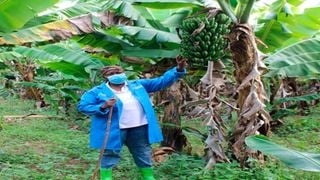
Ann Njoki on her Kitongoria Farm in Amagoro village, Trans Nzoia County.
| Gerald Bwisa | Nation Media GroupSeeds of Gold
Premium
The 458-acre all-in-one farm
Over the years, Trans Nzoia County has been known as the grain basket of the country, producing millions of bags of maize and beans.
However, this trend is changing as farmers embrace other crops and livestock in search of better prices that maize cannot offer.
One such a farmer is Ann Njoki, whose 458-acre Kitongoria Farm in Amagoro village off the Kitale-Eldoret highway, hosts some 10,000 banana plants, as well as seed maize, black nightshade, beans, commercial maize and maize silage. Njoki also keeps livestock.
“My father was a large-scale farmer and when I completed Form Four, I joined him in farming and have not stopped since then. I was the first woman to ride a tractor in Trans Nzoia,” says Njoki.
She farms the Grand Nain banana variety, which she gets seedlings from Kenya Agricultural and Livestock Research Organisation (Karlo) in Kitale.
“The seedlings need deep soil cultivation and harrowing. The fields should be free of trees, bushes and perennial weeds. Bananas can grow well with an annual rainfall of between 1,000 and 2,500mm,” she says.
The cultivation, she notes, should be done at the onset of rains. “Under dry conditions, dig holes 90cm by 90cm by 60cm, in wet areas the holes should be 60cm by 60cm by 60cm. We place them two metres apart and ensure each hole ends up with three seedlings for good yields after six months.”
Farm manager Maurice Barasa explains that at planting, early and good supply of nitrogen fertiliser is essential to accelerate the growth of pseudo-stems and faster flowering.
“Two to four debes of decomposed farmyard manure is applied per stem per year before the rains. NPK should also be used at planting.”
They harvest around 20 bunches of bananas a day and keep them in a cold room for sale on market days in the area on Tuesday and Saturday at Sh25 a kilo. They also sell a huge chunk of the produce to Kitale GK Prison.
Their bananas are arranged in three blocks to ease management, particular weeding and control of pests and harvesting.
50 rams
“It becomes easier since when we are done harvesting one block, we go to the other,” says Njoki.
On her livestock farm, she keeps 50 rams which are castrated and sold for meat.
“We have about 38 sheep. We also have over 25 dairy cows, 13 which we milk getting 200 litres a day and sell the produce at Sh40 per litre,” says the farm manager.

Ann Njoki on her Kitongoria Farm in Amagoro village, Trans Nzoia County.
Their poultry farm hosts 150 Kienyeji chickens while their two ponds 2,000 tilapia, 1,000 in each, which they harvest and sell a kilo at between Sh150 and Sh200, says Njoki.
On the pig farm, which they started last year, they keep 33 animals having started with six. The animals are sold to Farmers’ Choice which she has a contract with.
Barasa notes that while integrated farming stops the over-reliance on one crop, for instance maize and one uses manure from livestock to grow crops, it comes with some challenges.
“Sometimes it becomes expensive to treat the plants as well as animals in case there are disease outbreaks on the farm.”
Njoki advises farmers who wish to venture into integrated farming to be ready to spend on both crops and livestock.
Great problems
“There’s a challenge of climate change, which can pose great problems in terms of drought. It can become very difficult to water both crops and animals in case one suffers from water challenges.”
According to Kalro, Trans Nzoia has a favourable climate conditions and soils for various crop farming.
Anastacia Masinde, Kalro’s crop scientists in Kitale, advises farmers to plant the right banana variety for the region.
“Farmers should not borrow suckers from neighbouring farms since this is the main mode of spreading diseases. Acquiring the right suckers from certified farms ensures one doesn’t have a challenge with infestation of diseases which affect productivity.”
When planting bananas, she notes one should look out for pests like nematodes and be aware of market trends like value addition to reap more benefits since the industry is full of middlemen who dictate prices.
She urges farmers to focus on value addition of bananas which can be done by grinding flour, making pastry, banana jam and crisps.





